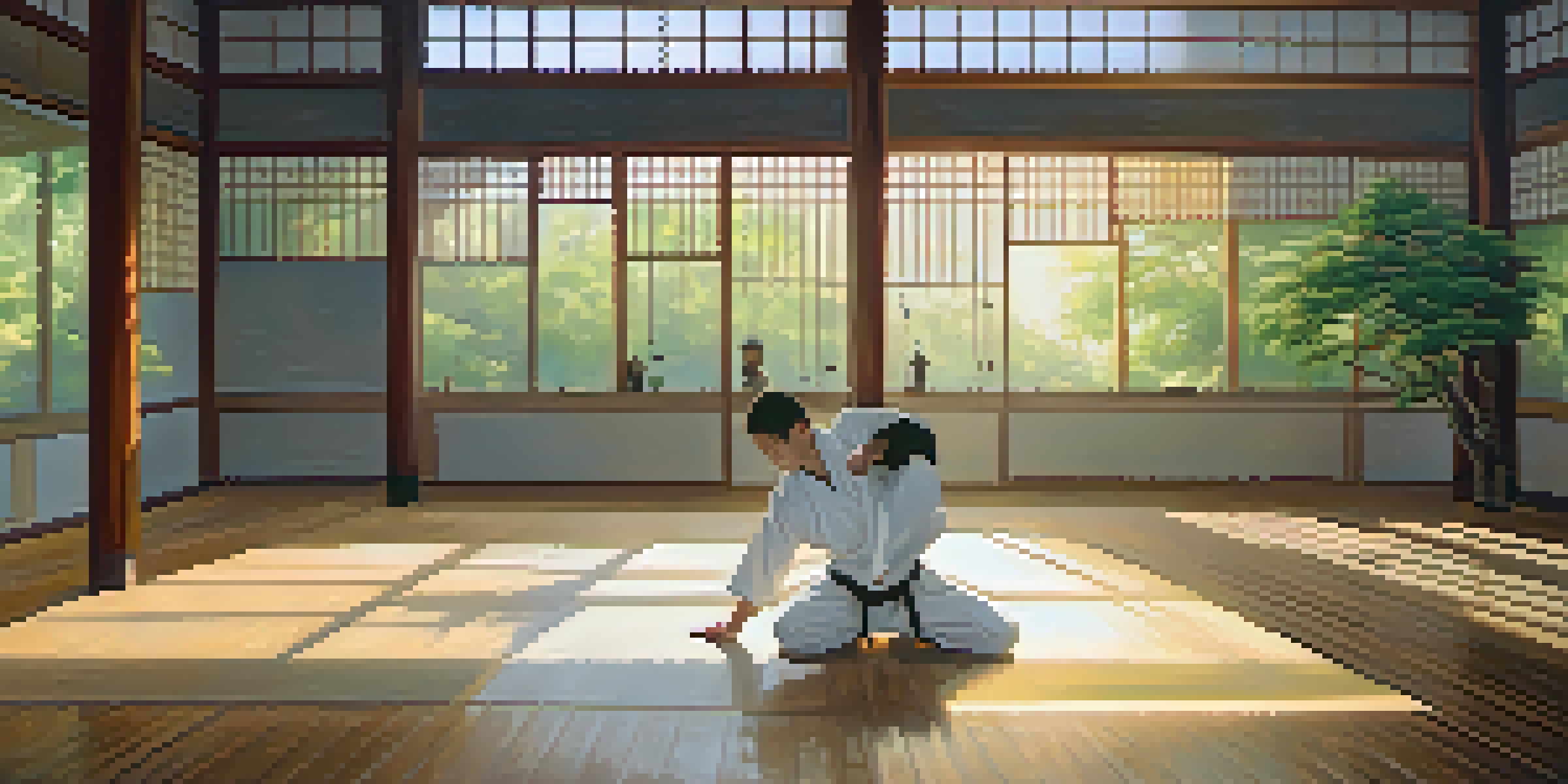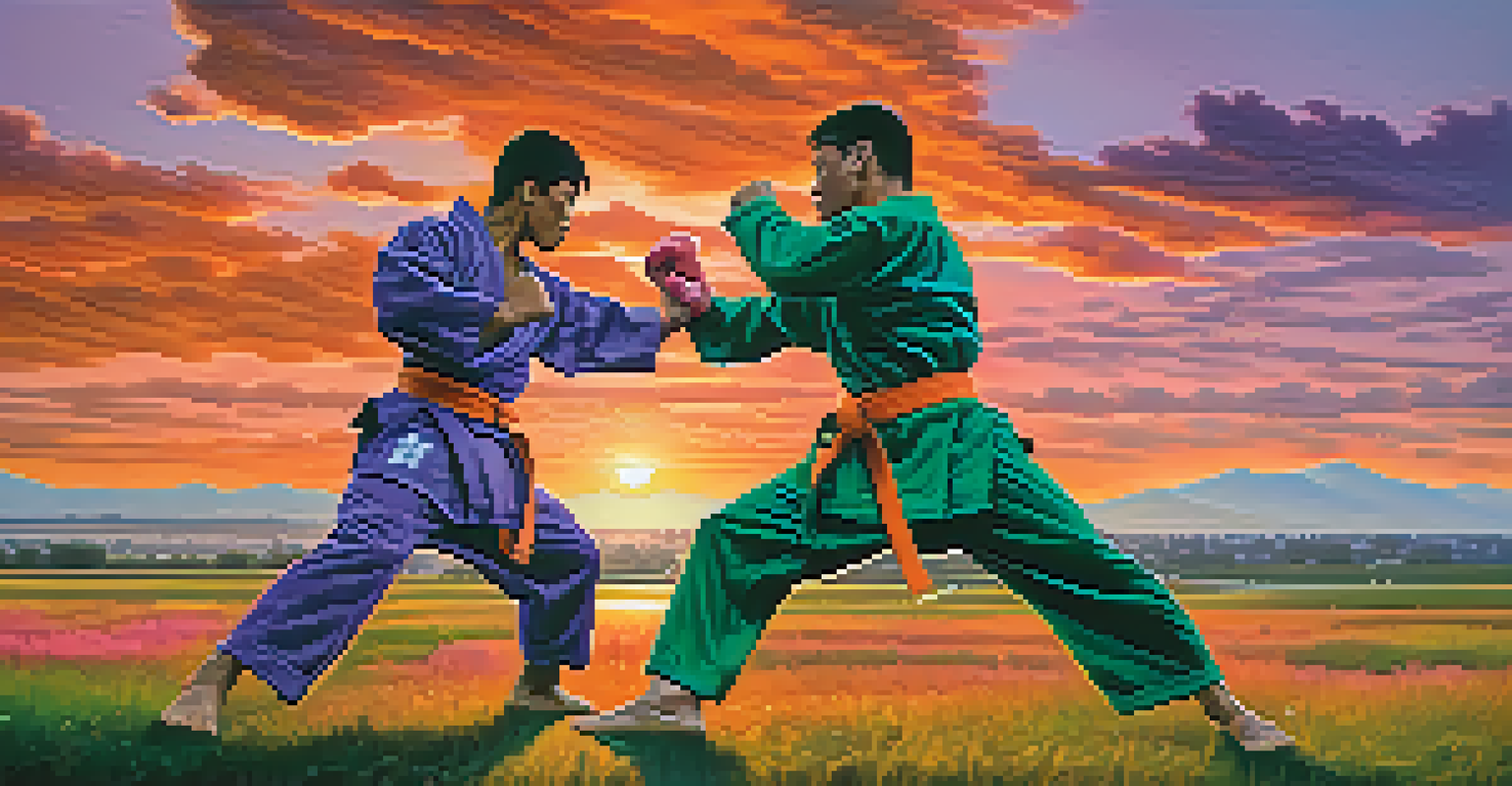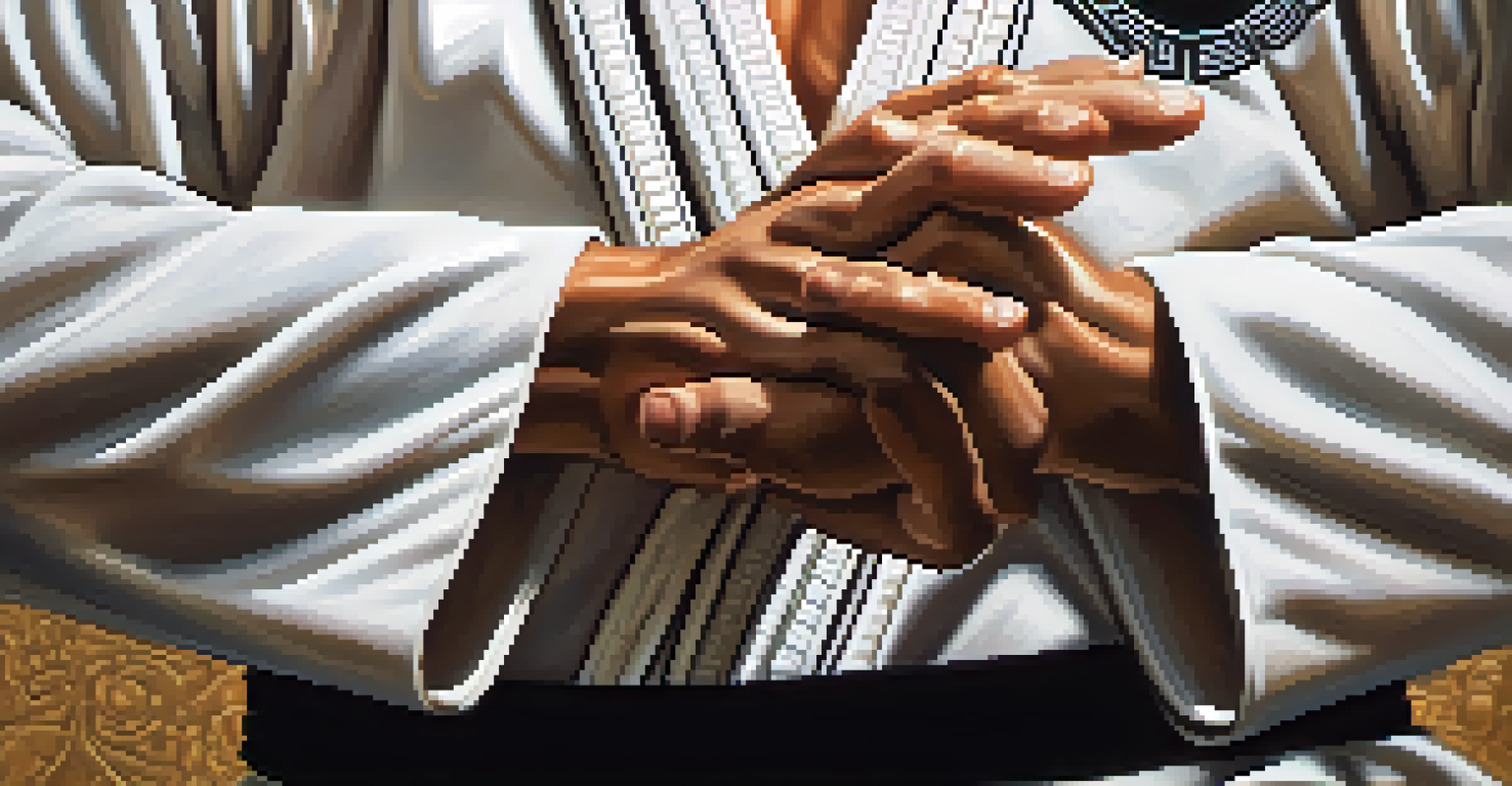How Physical Fitness in Martial Arts Enhances Mental Strength

The Connection Between Body and Mind in Martial Arts
Martial arts is often seen as a physical discipline, but its benefits extend far beyond muscle tone and agility. The connection between physical fitness and mental strength is profound, as training in martial arts teaches practitioners to push their limits. This holistic approach emphasizes that a strong body can lead to a strong mind, fostering resilience and determination.
The mind is everything. What you think you become.
When you engage in martial arts, every kick and punch requires focus, coordination, and discipline. This intense focus during training helps to clear mental clutter, allowing practitioners to develop a sharper mind. In essence, the physical exertion serves as a catalyst for mental clarity, enhancing overall cognitive function.
Moreover, the practice of martial arts often involves overcoming obstacles, whether it's mastering a new technique or facing a sparring partner. This constant challenge cultivates a mindset that embraces struggle and adversity, ultimately strengthening mental fortitude.
Endurance Training and Mental Toughness
Endurance is a critical aspect of martial arts training, pushing individuals to their physical limits. As practitioners engage in rigorous drills and long training sessions, they learn to manage fatigue and discomfort. This process of pushing through challenges builds mental resilience, teaching students that they can endure more than they initially thought.

Think of it like climbing a mountain: the ascent can be grueling, but the view from the top is worth every step. Similarly, martial artists face their own 'mountains' during training, and each challenge overcome reinforces their belief in their own strength. This newfound confidence translates into other areas of life, enabling them to tackle personal and professional challenges with determination.
Mind-Body Connection in Martial Arts
Martial arts training not only improves physical fitness but also enhances mental strength and resilience.
Ultimately, the mental toughness developed through endurance training in martial arts creates a mindset that welcomes challenges. Practitioners learn that setbacks are merely stepping stones on the path to success, reinforcing the idea that persistence pays off.
Discipline and Focus Cultivated Through Training
Discipline is a cornerstone of martial arts, requiring practitioners to commit to regular training and self-improvement. This commitment fosters a strong sense of focus, as students must concentrate on mastering techniques and refining their skills. The mental discipline developed in martial arts can lead to improved focus in daily life, enhancing productivity and goal achievement.
Success is where preparation and opportunity meet.
Consider the analogy of a sculptor chiseling away at a block of stone. With each precise strike, they gradually reveal a masterpiece. In much the same way, martial artists chip away at their weaknesses through disciplined practice, honing their abilities and sharpening their mental acuity.
Moreover, this discipline extends beyond the dojo, influencing other aspects of life. Students often find that the skills of focus and perseverance learned in martial arts help them excel in academics, careers, and personal relationships.
Stress Relief and Emotional Regulation in Martial Arts
Martial arts training offers an excellent outlet for stress relief, allowing practitioners to release pent-up emotions through physical activity. The act of training provides a constructive way to channel frustration and anxiety, leading to better emotional regulation. This is especially beneficial in today’s fast-paced world, where stress can easily overwhelm us.
Imagine a pressure cooker: without a release valve, it can explode. Martial arts act as that release valve, allowing practitioners to vent their frustrations in a controlled environment. This not only makes them feel better but also builds a foundation for managing stress in everyday life.
Endurance Builds Mental Toughness
The challenges faced during rigorous training develop mental resilience and a positive mindset towards overcoming obstacles.
As students learn to handle stress on the mat, they develop coping strategies that they can apply off the mat. The emotional resilience gained through martial arts enables them to approach life’s challenges with a calmer, more balanced mindset.
Building Confidence Through Skill Mastery
One of the most significant benefits of martial arts is the boost in self-confidence that comes from skill mastery. As students progress through their training, they achieve milestones that enhance their sense of self-worth. This newfound confidence is not only about physical prowess but also about the mental strength that comes from overcoming challenges.
Think of it as leveling up in a video game; each achieved belt or mastered technique is like unlocking a new ability. This sense of progress fuels motivation and reinforces the belief that hard work leads to success, impacting other areas of life positively.
Ultimately, the confidence gained through martial arts training empowers individuals to take on new challenges beyond the dojo. They carry this self-assurance into various aspects of their lives, from social interactions to professional endeavors.
The Role of Community in Strengthening Mental Resilience
Martial arts often fosters a sense of community among practitioners, creating a supportive network that can enhance mental strength. This camaraderie provides a safe space for students to share challenges and celebrate victories, reinforcing their emotional well-being. Being part of a community helps individuals feel less isolated in their struggles, promoting a sense of belonging.
Consider how a team of rowers must work in sync to move forward efficiently. Similarly, martial arts students learn to rely on one another during training, building relationships that contribute to their overall mental resilience. This support system cultivates a positive environment where individuals can thrive.
Community Strengthens Resilience
Being part of a supportive martial arts community fosters emotional well-being and builds lasting connections.
Moreover, the shared experiences within martial arts communities often lead to lasting friendships. These connections can act as a lifeline during tough times, offering encouragement and motivation when it’s needed most.
Mindfulness and Mental Clarity Through Martial Arts
Practicing martial arts inherently involves a level of mindfulness, as students must remain present and aware of their movements and surroundings. This focus on the present moment cultivates mental clarity, allowing practitioners to develop a deeper understanding of themselves. Mindfulness in martial arts can also lead to improved decision-making skills, both on and off the mat.
Imagine standing at the edge of a serene lake, where the water is perfectly still. This tranquility mirrors the mental state achieved through martial arts training, where practitioners learn to quiet their minds amidst the chaos of life. This calmness enhances their ability to think clearly and make sound choices.

Ultimately, the mindfulness developed in martial arts encourages practitioners to approach life with a sense of purpose and intention. This heightened awareness can lead to greater satisfaction and fulfillment in everyday activities.